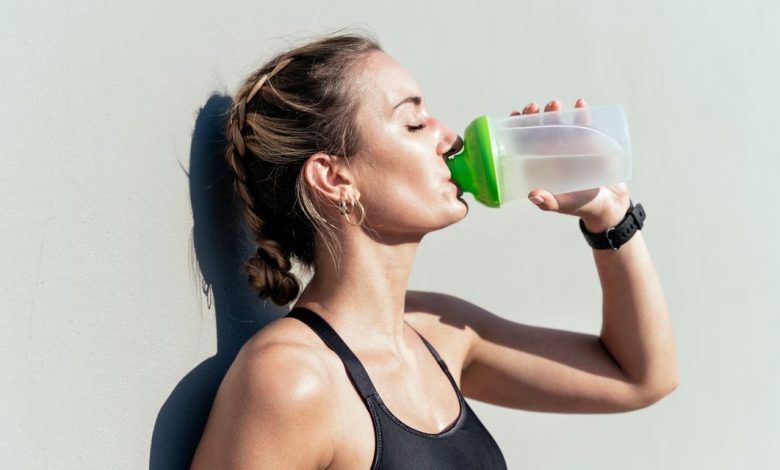That Bottle of Coconut Water Isn’t Doing As Much as You Think to Rehydrate You

All products featured on Self are independently selected by our editors. However, we may receive compensation from retailers and/or from purchases of products through these links.
Wrapping up an intense workout, you might turn to coconut water as your beverage of choice, figuring the added nutrients—specifically, its electrolytes—will help you rehydrate faster and better than regular H20.
It’s true that unlike regular water, coconut water naturally does contain sodium, potassium, magnesium, and other kinds of these charged minerals, all of which can help your body balance fluids more efficiently and thus accelerate your return to hydration baseline after a tough exercise session or another strenuous activity. For this reason, it’s earned a reputation as one of the best post-workout drinks out there. But Anthea Levi, MS, RD, CDN, a Brooklyn-based health writer and founder of Alive+Well Nutrition, tells SELF, it’s not totally deserving. In fact, she says, it’s a myth that “coconut water is a great source of electrolytes.”
Basically, the issue boils down to the fact that coconut water doesn’t offer a well-rounded electrolyte mix, according to Levi. “While coconut water does supply potassium, it’s not rich in sodium,” in contrast to alternatives like sports drinks and electrolyte supplements, she says. Per Ohio State University, a cup of store-bought coconut water contains 470 milligrams (mg) of potassium and 30 mg of sodium—more of the former than most athletes need, but significantly less of the latter.
And that’s a problem, since sodium is actually the main electrolyte lost in sweat. Like a biological magnet, according to Loma Linda University, it helps water pass in and out of your cells properly, promoting water absorption, preventing dehydration, and supporting essential bodily functions—so it’s important to have enough.
Because of this sodium shortage, coconut water is pretty limited in its ability to replenish depleted stores of that important electrolyte. That, in turn, hurts its ability to boost overall recovery—so treating it as a one-stop shop for post-workout electrolyte replacement would be a mistake. Of course, it’ll still help, but it’s not a miracle cure for dehydration as popularly believed.
Thankfully, if you love your post-workout coconut water, there’s an easy way to boost its hydrating benefits: Doctor up your bottle. By adding a pinch of sodium-rich table salt to your coconut water, you can easily introduce some of that lacking mineral, according to Levi. Or, for a more flavorful blend, try combining two cups cold water, one cup coconut water, one cup fruit juice, and an eighth of a teaspoon of salt, according to the University of Texas MD Anderson Cancer Center.
That said, don’t worry if you’re not digging a DIY solution: “Otherwise, opt for something with more sodium” right out of the gate, Levi says. Between all the electrolyte-packed products on the market, you have plenty of commercial options—Gatorade, Gatorade Thirst Quencher packets, Pedialyte, Liquid IV, LMNT, and many, many more.
Compared to plain coconut water, for example, a 20-ounce bottle of Gatorade contains 490 mg of sodium, not to mention 350 mg of potassium, along with other electrolytes like chloride, magnesium, and calcium. Decided to opt for the powdered stuff instead? One packet (a single serving) of Thirst Quencher contains 230 milligrams of sodium and 70 mg of potassium, respectively.
What’s more, these types of items are also rich in carbohydrates, nutrients that aid in electrolyte absorption (and exercise recovery). By comparison, coconut water is pretty meager on the carb front.
Before we let you go, a word of advice before you start packing on the Powerade: Take a moment to consider whether you really need the extra electrolytes. Generally, experts don’t recommend them if your body isn’t under a ton of strain (whether because of exercise, extreme heat, or illness), since you likely aren’t losing them in your day-to-day life at a rate high enough to warrant replenishment—so investing in a supplemental source might not even be necessary. And if you’re not sure if your activity fits the bill? Here’s how to tell if you should supplement with electrolytes post-workout.
Related:
- 12 Hydration Mistakes Leaving You Parched, According to Experts
- The 22 Best Water Bottles for Staying Hydrated Whenever, Wherever
- Here’s Exactly How Much Water You Should Drink Every Day
Get more of SELF’s great service journalism delivered right to your inbox.



